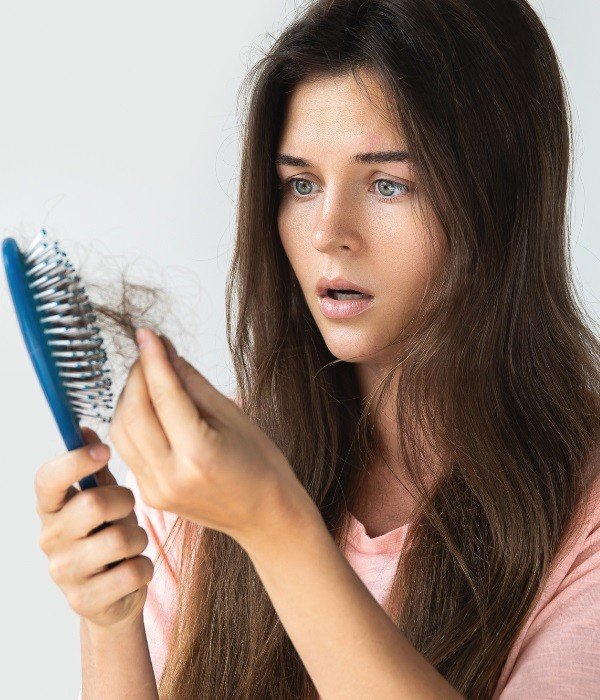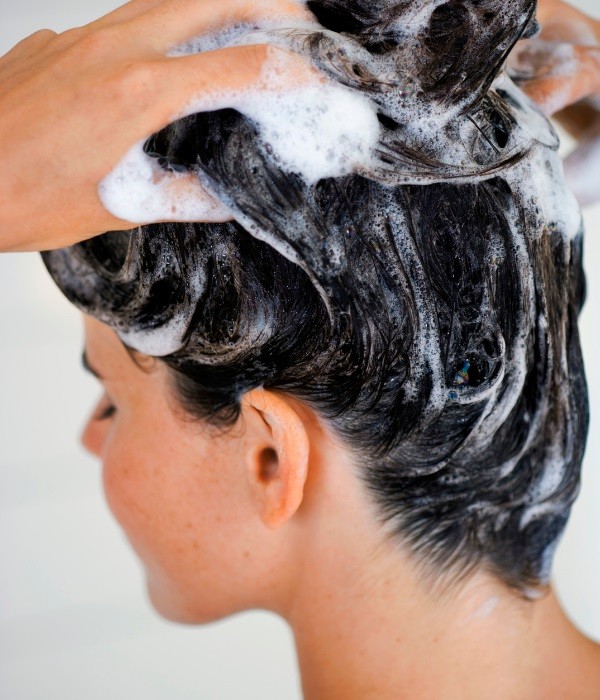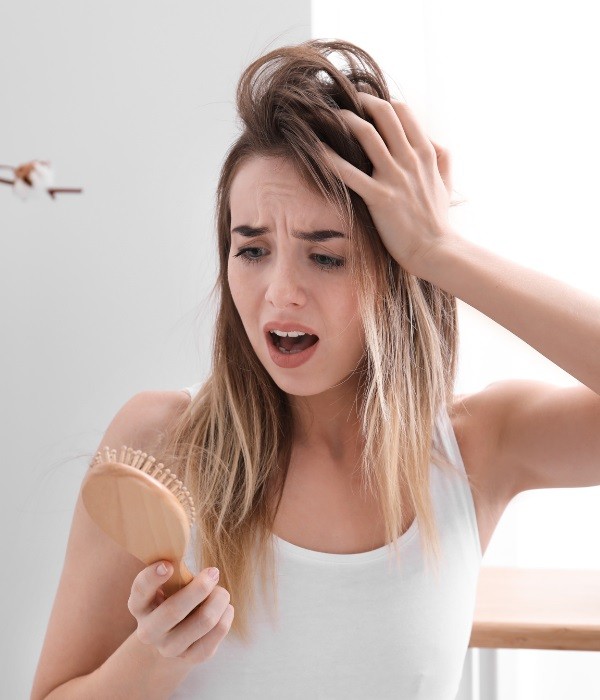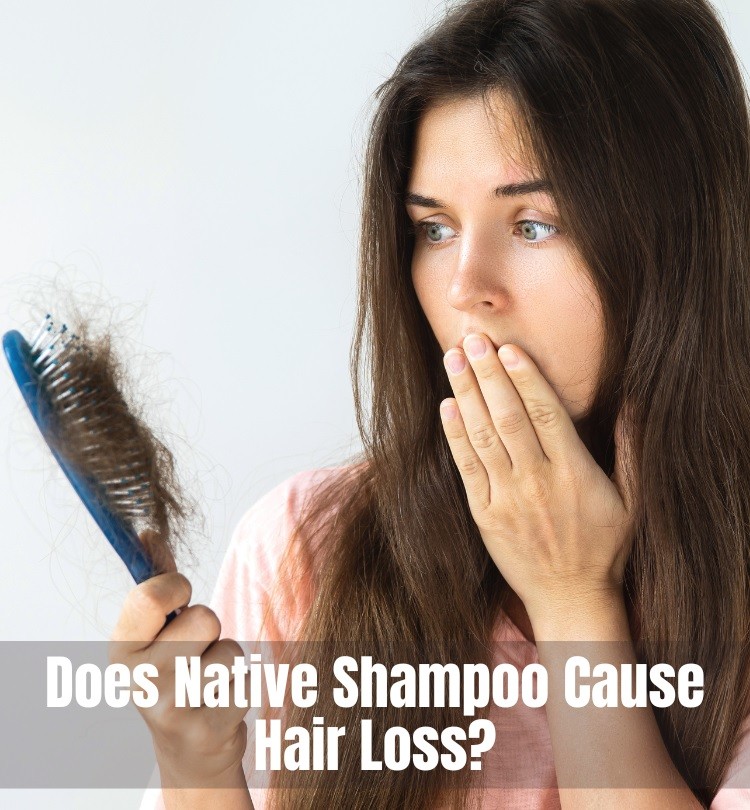This post contains affiliate links.
Updated on April 13, 2025
Native shampoos do not directly cause hair loss. Certain ingredients in some native shampoos may cause allergic reactions or scalp irritation, leading to hair loss as a secondary effect.
Hair loss is a common concern among both men and women. With so many hair products available in the market, it can be difficult to decide which ones are suitable for your hair type and will not cause damage in the long term.
Native shampoos, which are made from natural ingredients found in specific regions or countries, have gained popularity as a healthier alternative to chemical-based products. But, does using native shampoo cause hair loss? We explore the truth behind this question and help you make informed decisions about your hair care routine.
Contents
Need To Know About Hair Loss

Hair loss can be a troubling experience for anyone, whether you’re going bald or your part seems to be widening more each day. If you’re experiencing hair loss, you may have questions about what’s causing it and how to prevent it.
We’ll explore one common concern: does native shampoo cause hair loss? Before we dive into that question, let’s first understand what hair loss is and what causes it.
Related: Can I Use Setting Powder And Setting Spray Together?
Hair Growth Cycle
To understand hair loss, we have to first understand the hair growth cycle. Hair grows in three phases: anagen, catagen, and telogen. The anagen phase is the active growth phase that lasts between two to six years. The catagen phase is a transitional phase that lasts about two weeks, during which the hair follicle shrinks.
The telogen phase is the resting phase that lasts about three months, after which the hair falls out and the cycle starts again. At any given time, about 90% of our hair is in the anagen phase, while the remaining 10% is in the telogen phase.
Causes Of Hair Loss
Numerous factors can cause hair loss, from genetics and hormones to diet and lifestyle choices. In some cases, hair loss is reversible, but in others, it may be permanent. Let’s explore some of the key causes of hair loss:
- Genetics: One of the most common causes of hair loss is genetics. Male and female pattern baldness are hereditary conditions that cause thinning hair and eventual hair loss.
- Hormones: Hormonal changes, such as those that occur during pregnancy, menopause, and thyroid imbalances, can cause hair loss.
- Diet: Nutritional deficiencies can cause hair loss, particularly deficiencies in iron, vitamin d, and biotin.
- Medical conditions: Certain medical conditions, such as alopecia areata and scalp infections, can cause hair loss.
- Medications: Some medications, including chemotherapy drugs and blood thinners, can cause hair loss as a side effect.
Role Of Genetics, Hormones, And Diet In Hair Loss
Genetics, hormones, and diet can all play a significant role in hair loss. Male and female pattern baldness, for example, is caused by genetics, while hormonal changes can trigger hair loss in women. Nutritional deficiencies, particularly a lack of iron, vitamin D, and biotin, can also contribute to hair loss.
If you’re experiencing hair loss, it’s important to determine what’s causing it so you can take steps to prevent further loss and, where possible, regrow your hair.
Remember, while native shampoo may not cause hair loss, it’s important to use products that are gentle on your hair and scalp. Avoid harsh chemicals and stick to shampoos and conditioners that nourish and strengthen your hair.
Native Shampoo Ingredients

Are you searching for the best shampoo to nourish your hair? You might have heard about native shampoo, a popular brand in the market. Native shampoo claims to use natural ingredients that can enhance your hair growth, prevent hair fall, and make it look shiny and silky.
Have you ever wondered if the ingredients in native shampoo can cause hair loss? Let’s take a closer look at the commonly-used ingredients in native shampoo and find out.
List Of Ingredients In Native Shampoo
Native shampoo uses some key ingredients that make it stand out from other shampoos. Here are some of the commonly-used ingredients in native shampoo:
- Coconut oil
- Aloe vera
- Jojoba oil
- Shea butter
- Nettle extract
- Chamomile extract
- Lavender oil
- Rosemary oil
How Do These Ingredients Work On Hair?
- Coconut oil: Coconut oil is an excellent ingredient that nourishes hair roots, making them strong and healthy. It also acts as a moisturizer, which prevents hair from drying out and breaking.
- Aloe vera: Aloe vera is an effective ingredient that soothes the scalp and promotes hair growth. It also has anti-inflammatory properties that can reduce dandruff and itchiness.
- Jojoba oil: Jojoba oil is a natural emollient that conditions hair, making it soft and shiny. It also helps in controlling sebum production in the scalp, preventing oily hair.
- Shea butter: Shea butter is a natural butter that intensely moisturizes hair, promoting hair growth and preventing breakage. It also helps in repairing damaged hair.
- Nettle extract: Nettle extract is an effective ingredient that can reduce hair loss and stimulate hair growth. It also helps in preventing dandruff.
- Chamomile extract: Chamomile extract is a natural ingredient that strengthens hair and reduces hair breakage. It also soothes the scalp and reduces itchiness.
- Lavender oil: Lavender oil is an excellent ingredient that promotes hair growth and reduces hair loss. It also helps in controlling dandruff.
- Rosemary oil: Rosemary oil is a natural ingredient that stimulates hair growth and improves hair thickness. It also prevents hair thinning.
Studies Or Research On The Effects Of These Ingredients On Hair
Several studies have been conducted to analyze the effects of the ingredients in native shampoo on hair. According to a study published in the Journal of Korean medical science, coconut oil can prevent hair damage and promote hair growth. Another study published in the international journal of cosmetic science states that aloe vera can reduce dandruff and scalp itchiness.
Moreover, research conducted by the international journal of molecular sciences suggests that jojoba oil has anti-inflammatory properties that can soothe the scalp and reduce dandruff. Similarly, a study published in the journal of Ethnopharmacology states that shea butter can promote hair growth and repair hair damage.
Additionally, a study published in the Journal of cosmetic dermatology suggests that lavender oil can reduce hair loss and improve hair thickness.
Native shampoo uses natural ingredients that have been proven to promote hair growth, prevent hair loss, and improve hair thickness. It is always advisable to do a patch test before using any new product, especially if you have sensitive skin.
If you have any concerns or queries, it is best to consult a dermatologist.
Related: Can I Use Baby Powder As Setting Powder?
Native Shampoo And Hair Loss

There is a common belief that shampoo causes hair loss, and specifically, native shampoo is often accused of having this effect. Scientific research and studies have shown otherwise. Some of the common myths surrounding native shampoo and hair loss include:
- Native shampoo contains harsh chemicals that damage hair follicles
- Overuse of native shampoo can cause hair to fall out
- Certain ingredients in native shampoo, like sodium lauryl sulfate, lead to hair loss
Why These Myths Are Not Based On Scientific Evidence
Unfortunately, many people believe these myths without looking into their validity. It is important to note that these myths are not based on scientific evidence. Here are some explanations:
- Native shampoo typically contains mild and natural ingredients and is formulated to maintain the health of the scalp, making it less likely to cause hair loss.
- Overuse of any shampoo can cause hair to become brittle and break off, but it does not necessarily lead to hair loss.
- Sodium lauryl sulfate and similar ingredients are not linked to hair loss. In fact, these chemicals are used to remove excess oil and dirt from hair, leading to a healthier scalp.
Available Research On The Link Between Native Shampoo And Hair Loss
The research on the connection between native shampoo and hair loss is limited. Many studies have found no evidence that native shampoo causes hair loss. Here are some key findings:
- A study published in the international journal of cosmetic science analyzed the effects of various shampoos on hair loss and concluded that shampoo, including native shampoo, does not significantly affect hair loss.
- Another study conducted by the international journal of Trichology found that hair fall was not significantly associated with the type of shampoo used, including native shampoo.
- A third study published in the Journal of the American academy of Dermatology similarly found no correlation between hair loss and the use of shampoo, including native shampoo.
The widespread belief that native shampoo causes hair loss is a myth. The use of native shampoo, like any other shampoo, is unlikely to contribute to hair loss. It is important to rely on scientific evidence rather than myths and misinformation when it comes to hair care.
Related: Do You Use Setting Spray After Setting Powder?
Frequently Asked Questions
Is Using Native Shampoo Better For Hair Health?
Using native shampoo can be beneficial for hair health as it contains natural ingredients, free from harmful chemicals.
Can Shampooing Excessively Cause Hair Loss?
Over-shampooing can irritate the scalp, making hair thin, but it’s rare that it causes hair loss.
Is It Okay To Skip Shampooing The Hair?
It’s okay to skip shampooing once or twice a week to maintain the natural oils in your hair.
Does Using Hot Water To Wash Hair Cause Hair Loss?
Using hot water can damage hair and scalp, but it doesn’t cause hair loss directly.
Does Native Shampoo Cause Hair Loss?
No, native shampoo doesn’t cause hair loss as it doesn’t contain harmful chemicals that can damage hair.
Conclusion
After analyzing various studies and research, we can conclude that using native shampoo does not directly cause hair loss. Certain ingredients present in the shampoo may cause an allergic reaction or irritate the scalp, leading to breakage and hair loss.
It is crucial to understand your hair type, scalp condition and the ingredients of the shampoo before making a choice. While native shampoo is organic and free from harmful chemicals, it may not be suitable for everyone. It is always recommended to consult a dermatologist or hair specialist before changing your shampoo or any haircare routine.
Be mindful of the ingredients in your hair products, listen to your hair, and take the necessary actions to maintain healthy hair and scalp. Remember, hair care is a personalized journey, and what works for one may not work for another.

